Introduction – AI Applications in Daily Life
Artificial Intelligence (AI) has rapidly evolved from a conceptual notion to a crucial aspect of AI applications in daily life, greatly impacting our interactions with technology and our navigation of the modern world.
In this era of rapid technological advancement, AI has become a powerful force that is revolutionizing various aspects of everyday life in different industries.
With the rise of AI-driven apps, our lives have been transformed in countless ways. From personal virtual assistants to recommendation systems, these technologies have revolutionized how we live, bringing us increased efficiency, convenience, and an improved quality of life.
This article explores the significance of AI applications in everyday life, highlighting their importance, implications, and potential for further advancement.
Through an exploration of various applications of AI in personal aid, healthcare, navigation, finance, and other areas, we aim to highlight the transformative impact of AI on our lives.
AI has empowered individuals and contributed to social advancement in significant ways. As we delve into these different applications, we uncover the incredible potential of AI to address societal challenges and drive innovation, creating a more interconnected and intelligent future for everyone.
Personal Assistants – AI Applications in Daily Life
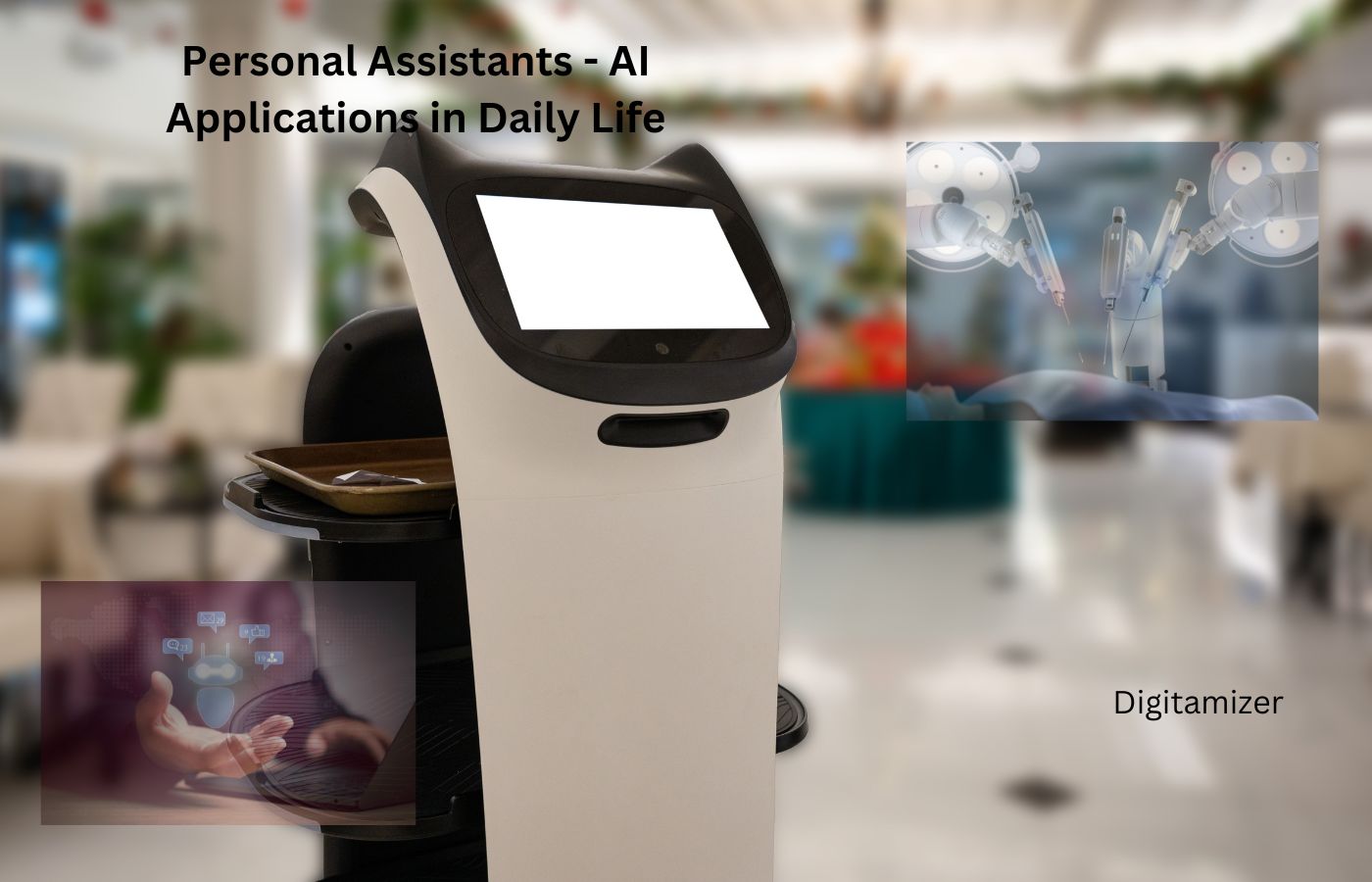
Personal assistants are incredibly helpful individuals who provide support and assistance in various tasks. They are skilled at organizing schedules, managing appointments, and handling administrative duties.
With their attention to detail and ability to multitask, personal assistants ensure that everything runs smoothly and efficiently. Personal assistants powered by Artificial Intelligence (AI) have become indispensable in our modern world, seamlessly integrating into our everyday routines to provide personalized assistance and streamline tasks.
Virtual assistants such as Siri, Google Assistant, and Alexa utilize advanced algorithms for natural language processing (NLP) and machine learning to understand user needs, manage schedules, and control smart devices.
Personal assistants are constantly improving their actions to accommodate personal preferences and needs, utilizing user feedback and interactions to enhance their capabilities.
Provide up-to-date information on traffic, weather, or news announcements over the phone. In addition, through seamless integration with Smart home gadgets, they offer convenient hands-free control over lighting systems, home automation systems, thermostats, and entertainment systems.
Personal assistants have completely transformed the way we interact with technology, making it easier and more efficient. They enable individuals to complete tasks with greater efficiency and ease.
Whether it’s managing data and coordinating schedules or overseeing smart home appliances, it’s all part of the job. AI-powered personal assistants have become invaluable tools for navigating the challenges of modern life, AI applications in daily life boosting productivity, and keeping people connected and informed in today’s fast-paced digital world.
Recommendation Systems – AI Applications in Daily Life
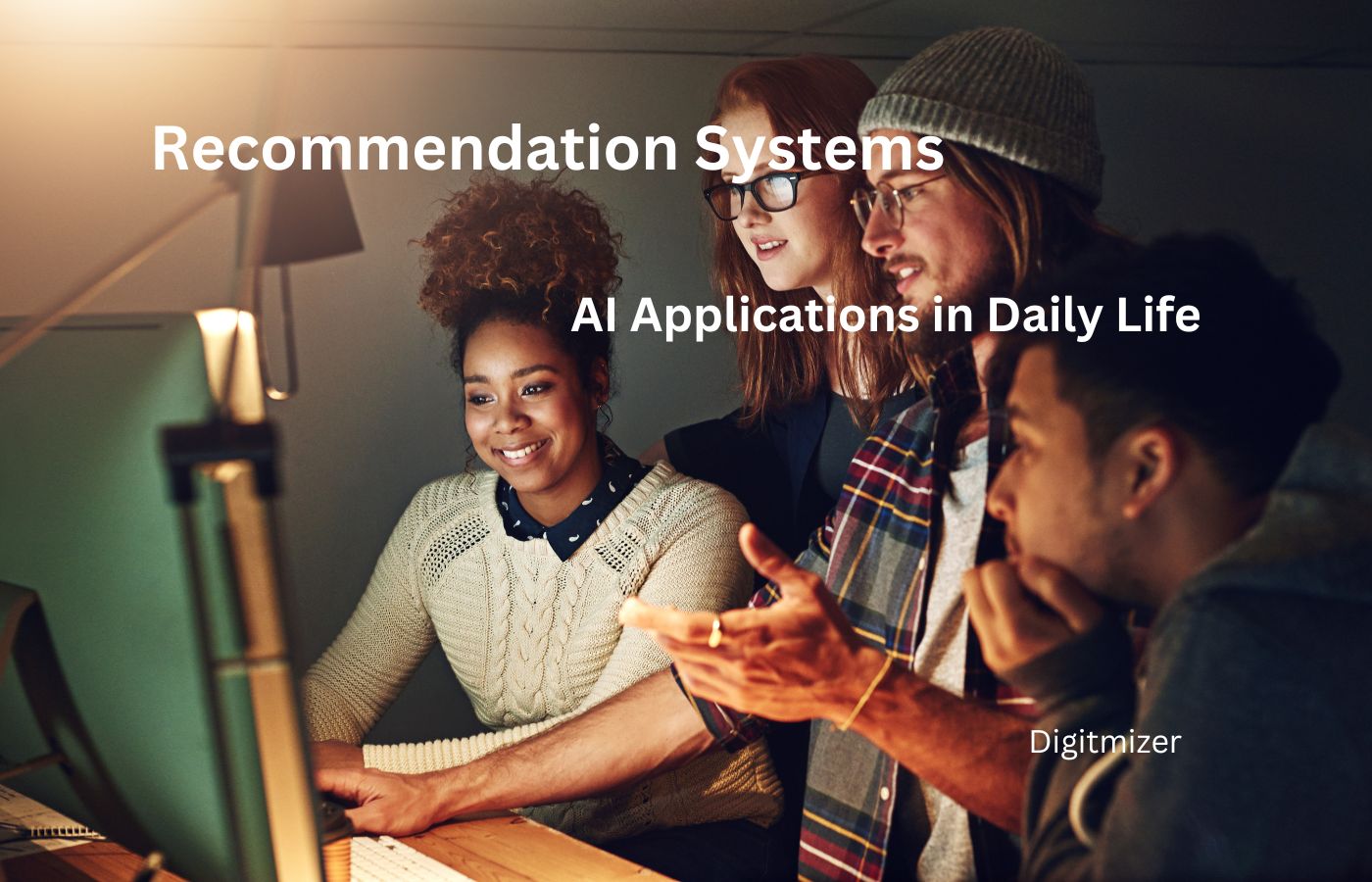
Artificial Intelligence (AI) has revolutionized the way we search for items and content on the internet. By offering personalized recommendations tailored to individual preferences and desires, recommendation systems have transformed the search experience.
These systems, utilized by major companies such as Netflix, Amazon, and Spotify, meticulously examine vast quantities of user data and employ advanced algorithms to ascertain user preferences and provide tailored product recommendations.
Using techniques such as collaborative filtering or content-based filtering, recommendation systems analyze user behavior such as viewing history, purchase history, and interactions with similar users to identify patterns.
Using the data, they generate tailored suggestions for movies, music, TV shows, books, and other products to enhance user satisfaction and involvement.
Similar to a systems analyst, recommendation systems are constantly learning and adapting to improve the accuracy of their recommendations. Improving the dependability and precision of their suggestions.
They enable users to delve into fresh content, explore into specific interests, and uncover products that align with their preferences, ultimately enhancing the user experience and fostering customer loyalty and retention.
Furthermore, apart from assisting consumers, these recommendation tools offer valuable insights to companies, enabling them to comprehend consumer behavior, enhance their product offerings, and boost sales through targeted marketing and personalized recommendations.
Ultimately, AI-powered recommendation systems and AI applications in daily life have a significant role in shaping the online experience, mimicking content discovery, and contributing to the success of e-commerce in the digital age.
Online Customer Support – AI Applications in Daily Life
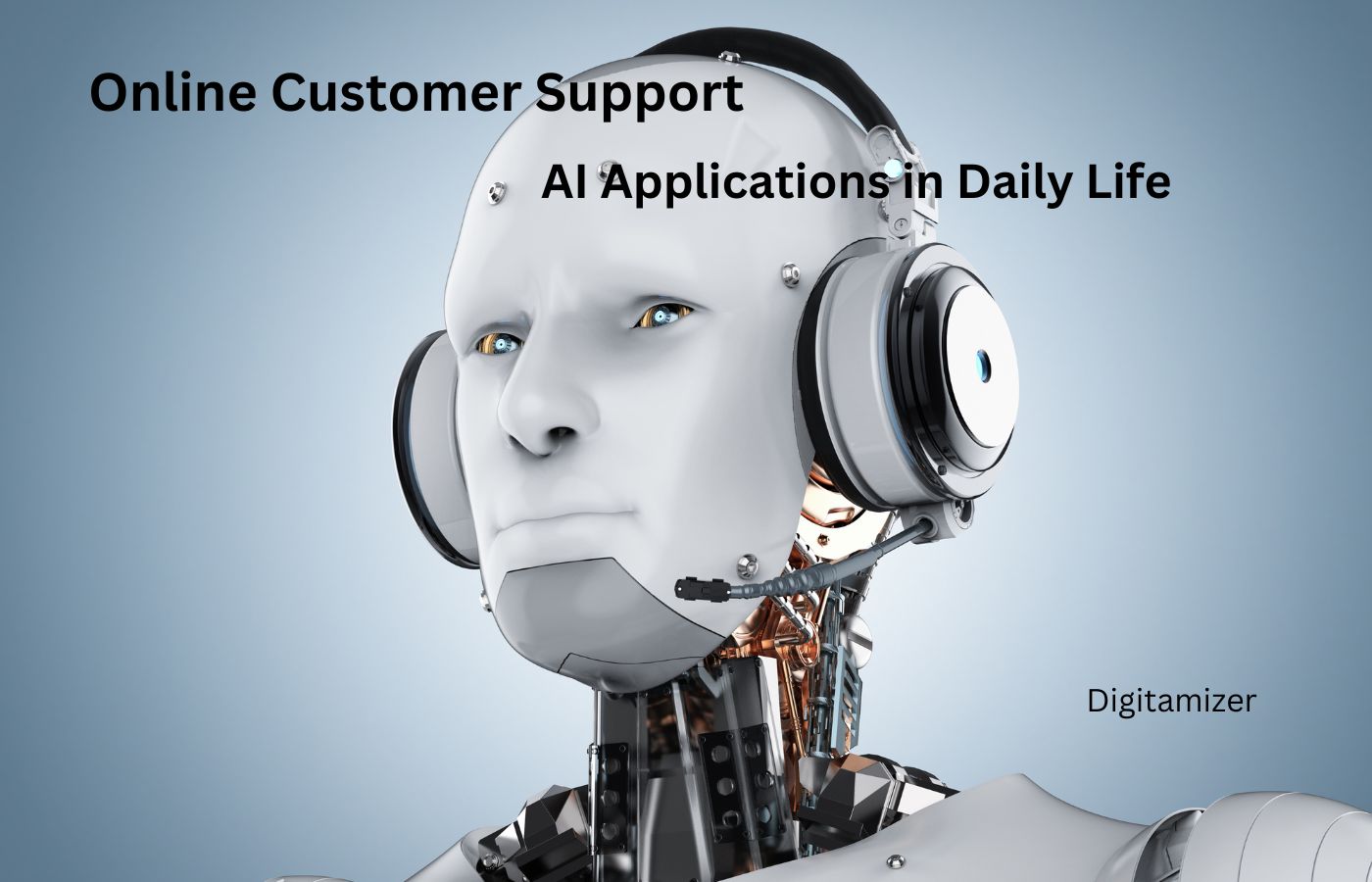
Customer support online powered by Artificial Intelligence (AI) has completely transformed the way companies interact with their customers, providing immediate assistance and swift resolution of inquiries.
Chatbots powered by AI are capable of communicating with users using natural language, providing round-the-clock assistance and support on messaging and website platforms.
Virtual agents utilize advanced algorithms to excel in the area of natural language understanding (NLU) and sentiment analysis. This enables them to accurately comprehend user inquiries and deliver relevant responses.
They possess the skills to address various inquiries, such as providing product details, resolving issues, tracking orders, and handling billing concerns. This helps minimize the need for human involvement and speeds up response times.
By automating repetitive tasks and providing answers to frequently asked questions, AI chatbots enable human agents to focus on more complex and valuable interactions.
This enhances the overall efficiency of customer service and leads to higher levels of satisfaction. Furthermore, by constantly learning and refining their past interactions, chatbots enhance their communication skills and become more efficient in their responses as time goes on.
AI-powered online customer service offers unparalleled convenience and accessibility, ensuring customer satisfaction by providing immediate assistance anytime and anywhere.
With the increasing adoption of AI-powered solutions and AI applications in daily life, companies are poised to revolutionize online customer support. This transformation will result in enhanced efficiency and personalization, ultimately leading to higher customer retention and loyalty in today’s digitally-driven world.
Exploring Maps and Navigation – AI Applications in Daily Life
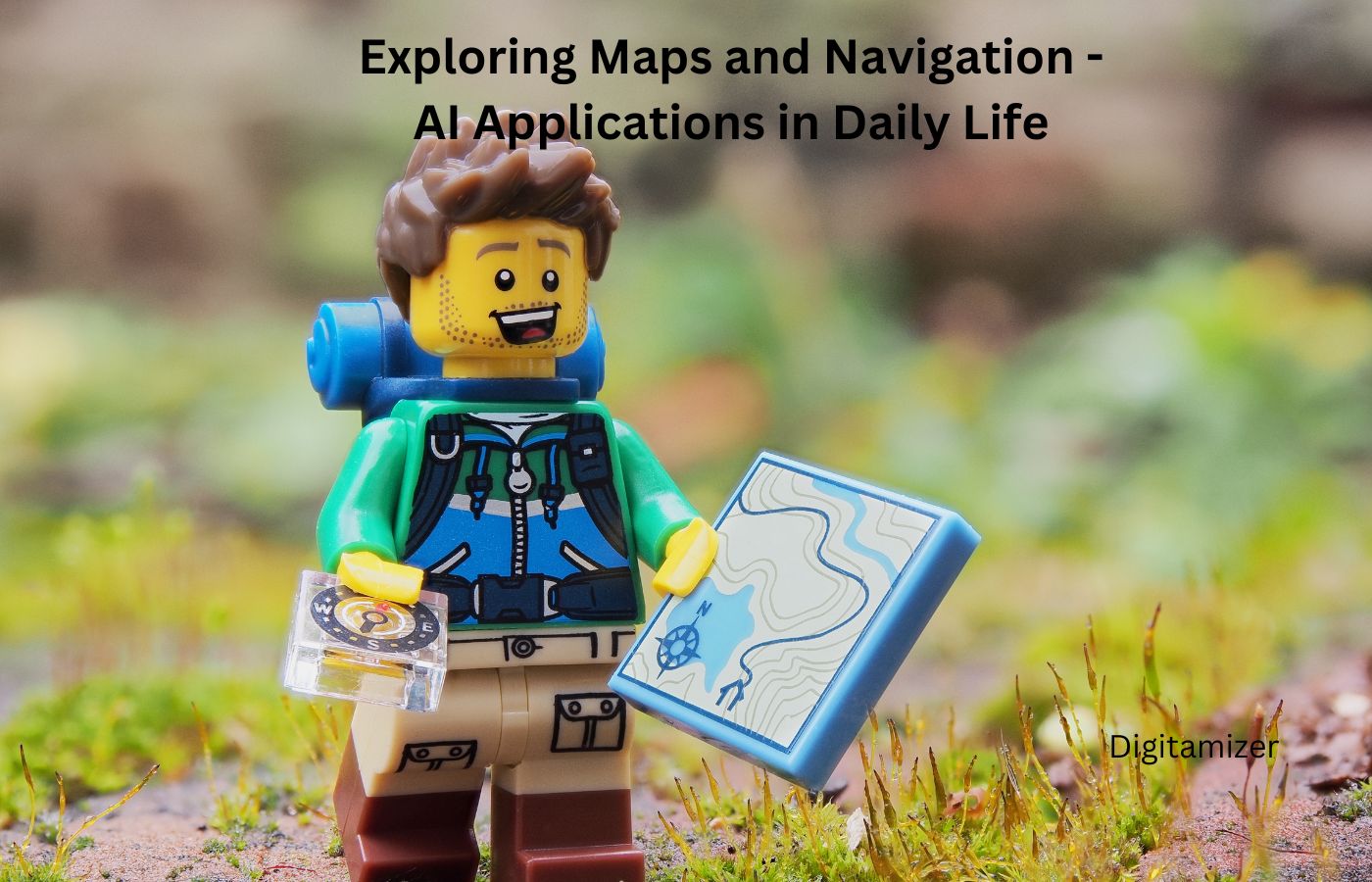
Artificial Intelligence (AI) has completely transformed the way people navigate and explore their surroundings through maps and navigation systems.
Applications like Google Maps and Waze utilize AI algorithms to provide instant navigation assistance, along with real-time traffic updates and optimized routes.
These platforms efficiently process and gather vast amounts of data from various sources, such as GPS sensors, traffic cameras, and user reports, to deliver accurate and up-to-date navigation information.
With the help of advanced algorithms and machine learning, this technology can accurately anticipate traffic patterns, alert drivers about congested areas, and suggest alternative routes for a smoother journey.
Similar to a systems analyst, AI-powered navigation systems continuously improve their accuracy and speed by learning from user feedback and real-time data, resulting in enhanced suggestions.
They consider the impact of traffic closures, accidents, and construction zones, providing flexible routing choices that minimize travel time and prevent delays.
Utilizing AI in maps and navigation has greatly enhanced the travel experience for countless individuals worldwide, providing them with a seamless and dependable means of getting around.
Whether it’s commuting to work, planning a road trip, or discovering new places, AI-powered navigation systems provide users with the confidence to navigate and reach their destination efficiently and securely. This technology enhances accessibility and mobility in our interconnected world.
Smart Home Devices – AI Applications in Daily Life
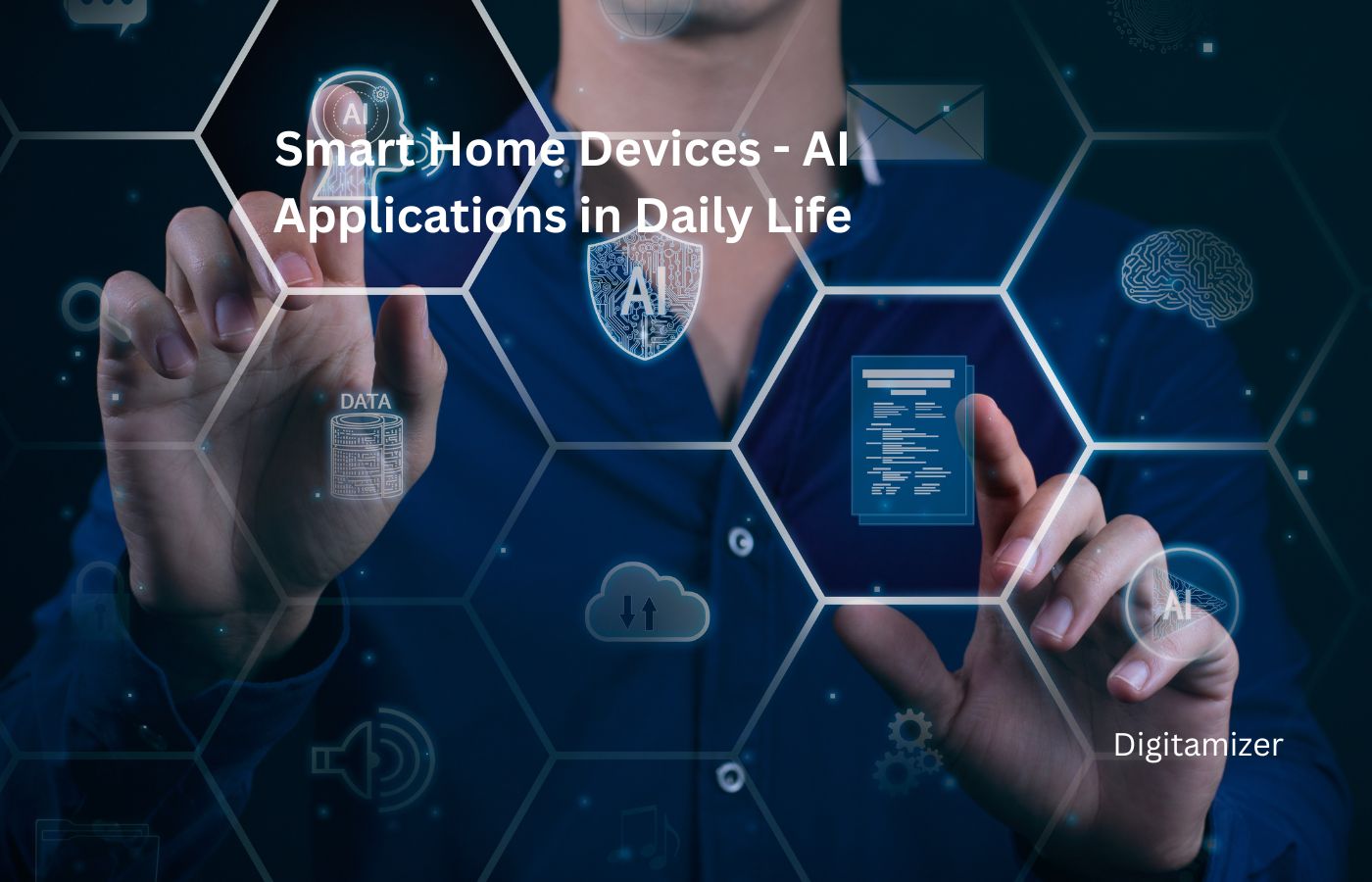
Smart home devices, powered by Artificial Intelligence (AI), have completely transformed living spaces, offering unparalleled comfort, convenience, and efficiency.
These appliances, including security cameras, thermostats, and voice-activated assistants like Amazon Echo and Google Home, utilize AI algorithms to streamline tasks and adapt to user preferences.
By analyzing data from sensors and user behavior, smart home devices powered by Artificial Intelligence can identify patterns and habits. They then make adjustments to optimize energy usage and enhance comfort.
For example, smart thermostats adjust temperature settings based on occupancy and weather conditions. Smart lighting systems adjust the brightness and color temperature based on seasonal changes and user preferences.
In addition, the incorporation of voice commands and mobile apps enables smart home devices to offer convenient remote monitoring and control, allowing users to effortlessly manage their homes from anywhere.
They provide features such as voice-activated controlled lighting, remote doorbell monitoring, and smart locks for enhanced security and convenience.
The seamless integration of AI into smart home appliances has made home automation more accessible and user-friendly, improving quality of life and optimizing energy efficiency.
With the help of AI-powered home devices, homeowners can now effortlessly automate routine tasks and create personalized environments that perfectly match their preferences and needs. This revolutionary technology is transforming the concept of modern-day living.
Healthcare Diagnostics – AI Applications in Daily Life
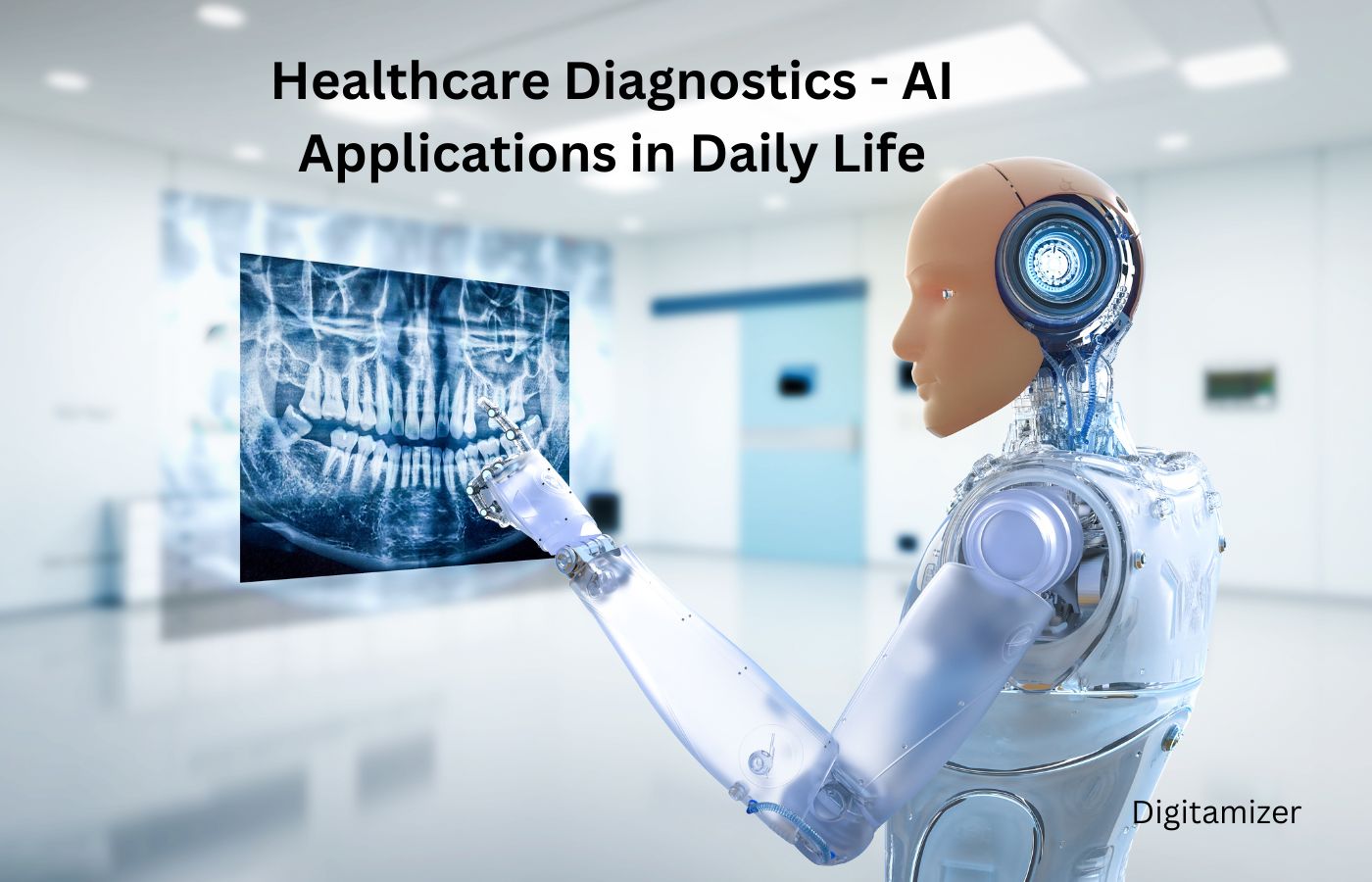
Artificial Intelligence (AI) has completely transformed healthcare diagnostics, offering incredible capabilities for disease detection, diagnosis, and treatment planning.
AI algorithms analyze large volumes of medical data, including images, patient information, and genomic data, to assist healthcare professionals in making precise and timely diagnoses.
When it comes to medical imaging, AI algorithmic analysis can efficiently detect irregularities and identify patterns that may indicate various diseases, including heart disease, cancer, and neurological conditions.
With a keen eye for detail and a deep understanding of medical imaging, AI revolutionizes the diagnostic process by improving accuracy and efficiency. By analyzing radiology scans, pathology slides, and other medical images, AI enables early problem detection and timely intervention.
AI-driven diagnostics are also applicable to predictive analytics, as well as tailored medicine, which analyzes patient information to predict the progression of diseases as well as treatment outcomes and the response to treatments.
By combining clinical data, genetic data, and lifestyle variables, AI enables the customization of treatment plans for individual patients, leading to improved outcomes and reduced negative side effects.
Utilizing AI for healthcare diagnosis has the potential to improve patient outcomes, lower healthcare expenses, and enhance the quality of clinical decision-making.
With the help of AI-powered diagnostics, healthcare professionals can enhance their capabilities and detect diseases earlier. This can lead to a more efficient and customized approach to healthcare, ultimately improving the quality of healthcare and the patient experience.
Language Translation – AI Applications in Daily Life
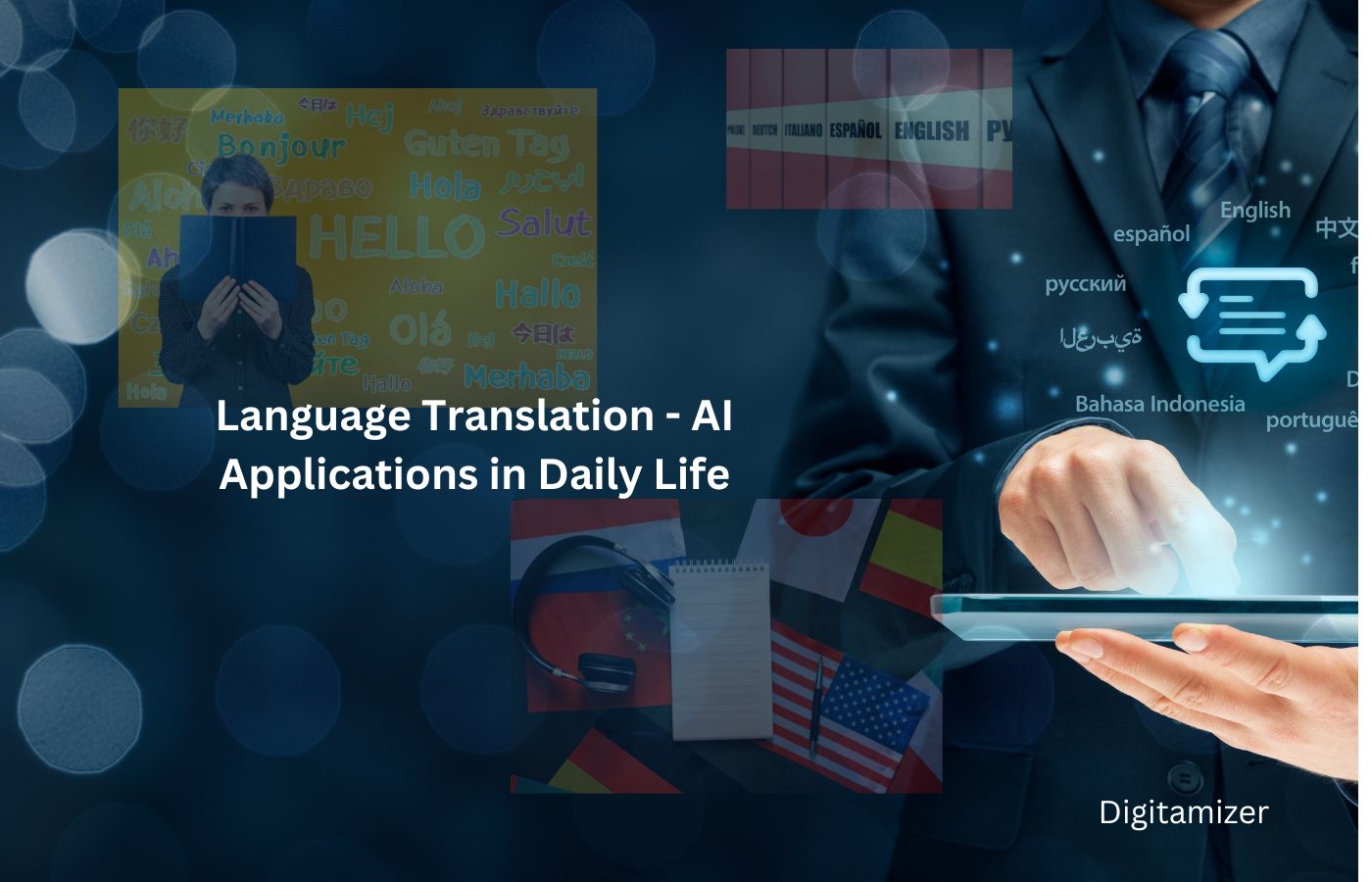
Artificial Intelligence (AI) has revolutionized communication by breaking down barriers and fostering global connectivity.
Translation tools, like those used by Google Translate, utilize advanced algorithms and deep-learning techniques to efficiently translate speech and text across different languages.
These platforms analyze vast amounts of multilingual texts and audio recordings to train machines to understand the nuances of language and context.
Through feedback and the identification of human errors, AI translation tools steadily enhance their accuracy and speed over time, resulting in translations that are increasingly precise and natural-sounding.
AI-driven translation has greatly enhanced collaboration and communication across cultures in diverse fields, including education, business, and diplomacy.
It enables individuals and companies to overcome language barriers and promotes the global exchange of ideas, knowledge, and resources.
In addition, AI translation tools enable users to consume multilingual content, making it easier for them to access and comprehend information in their preferred language.
AI-powered translation enhances accessibility and inclusion by facilitating communication across languages and fostering cultural exchange and understanding. It covers a wide range of mediums, including documents, websites, social media posts, and multimedia content.
As AI translating technology progresses, it has the potential to revolutionize communication and collaboration across borders, enabling communities and individuals to connect and engage in a more interconnected world.
Content Creation – AI Applications in Daily Life
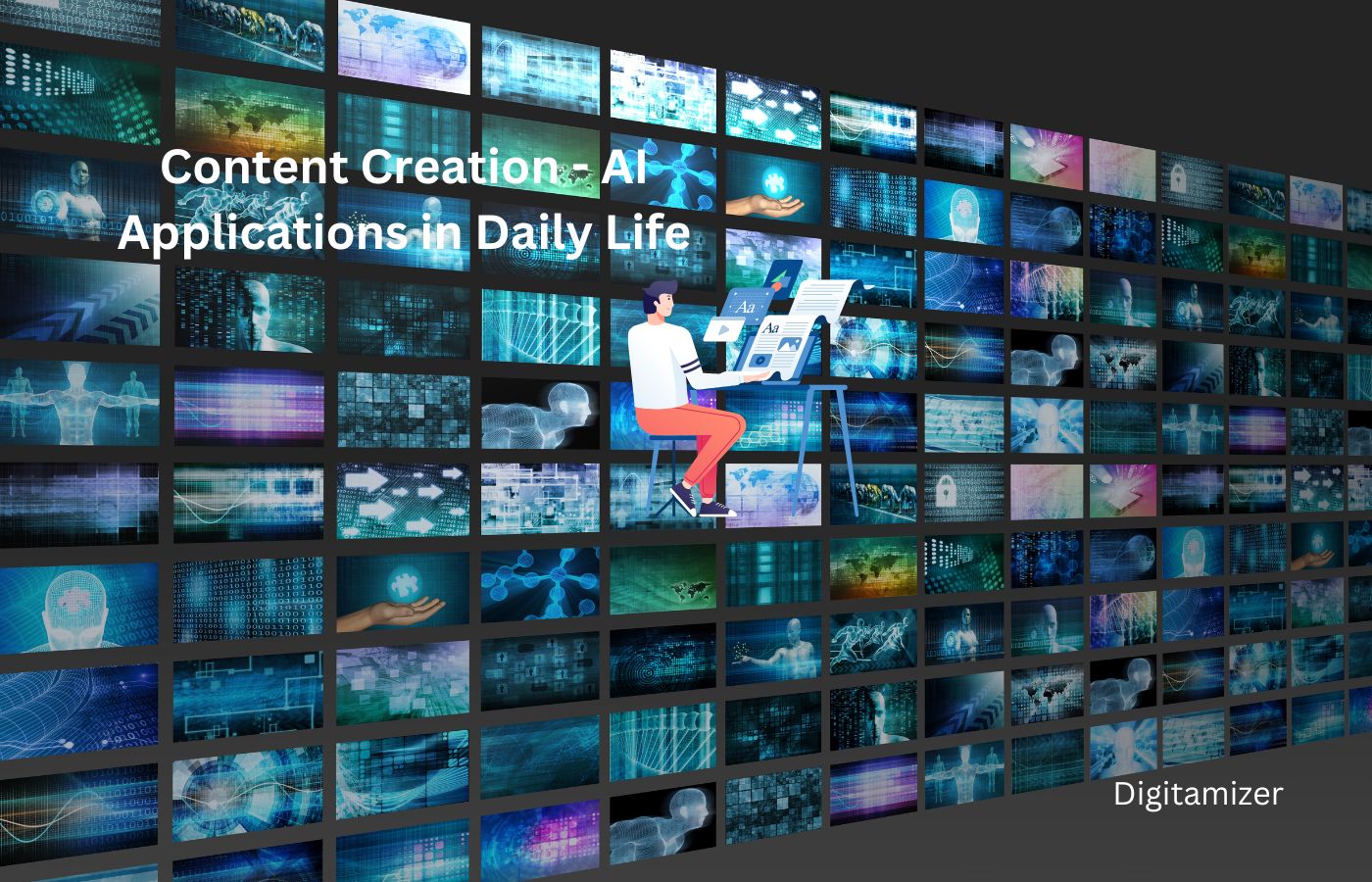
Artificial Intelligence (AI) has completely transformed content creation, providing marketers, writers, and creators with advanced tools that greatly accelerate the editing and writing process.
AI-powered platforms like Grammarly and Wordtune utilize advanced natural language processing algorithms to provide instant suggestions for enhancing grammar, improving writing style, and optimizing content.
These platforms analyze text inputs and identify errors in grammar, punctuation, and syntax, offering suggestions to enhance clarity and readability.
With a deep understanding of context and language models trained on vast datasets, AI content creation tools offer personalized recommendations tailored to the user’s preferences.
In addition, AI-powered tools for generating content enable the optimization of content to achieve different objectives, including audience engagement, SEO, and conversion optimization.
With tools that offer suggestions for keywords, evaluate readability, and make tone adjustments, authors can create captivating and impactful content that resonates with their intended audience.
By automating repetitive tasks and offering intelligent assistance during the writing process, AI tools for content creation significantly enhance efficiency and productivity for content creators.
They empower users to express their ideas with efficiency and effectiveness, enabling them to focus on innovation and creativity while maintaining the utmost accuracy and quality in their work.
Financial Services – AI Applications in Daily Life
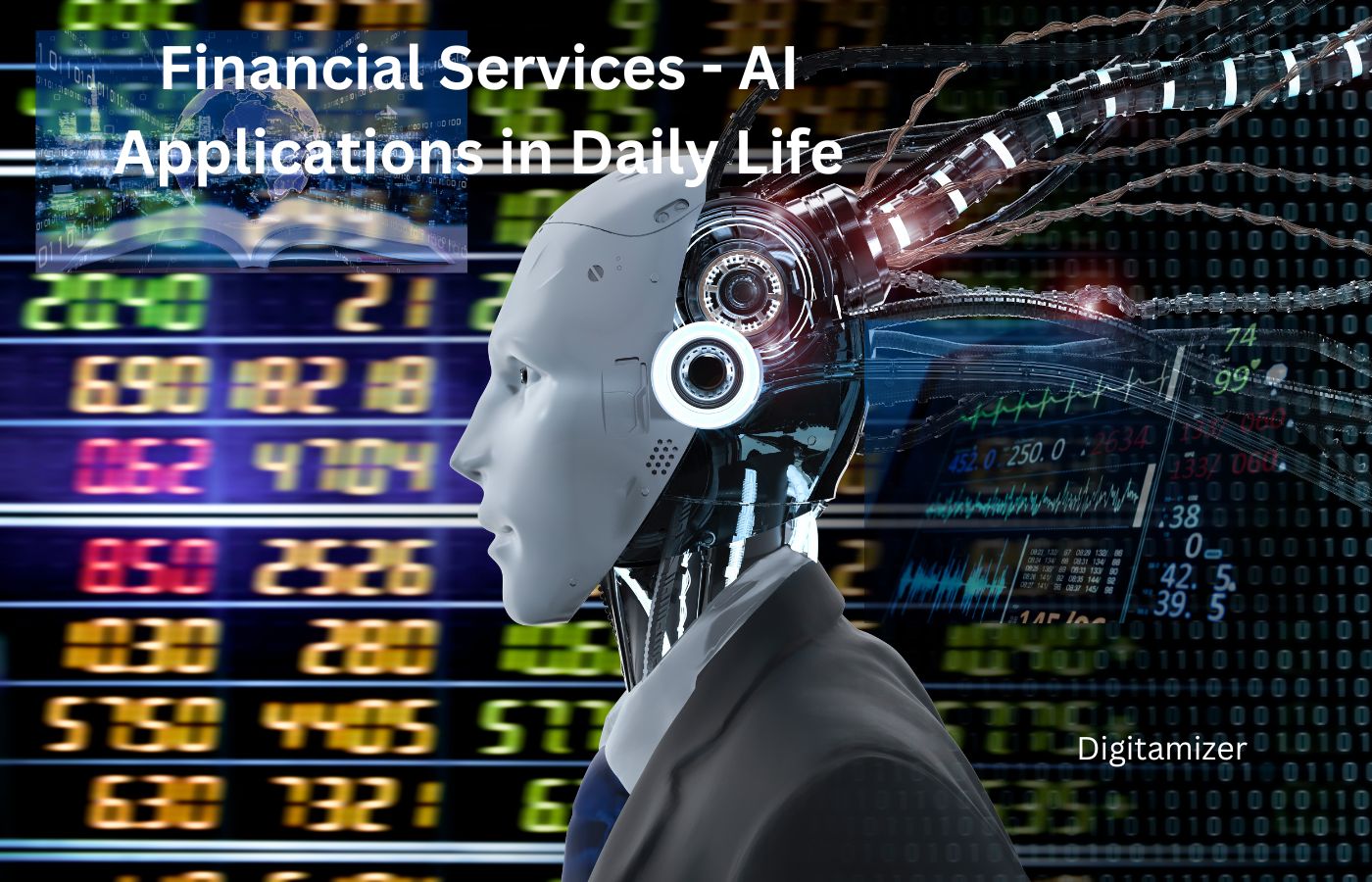
Artificial Intelligence (AI) has a profound impact on the financial services industry, transforming risk management, fraud detection, and personalized financial advice.
AI algorithms analyze extensive economic data to identify patterns, trends, and anomalies, enabling faster and more precise decision-making.
In the area of fraud prevention, AI algorithms utilize machine learning techniques to detect fraudulent activity, such as fraud or identity theft, in real-time.
By carefully examining transactional data and user behavior, experts in this field can detect and prevent suspicious transactions, effectively minimizing financial losses for businesses and individuals.
AI-driven algorithms are crucial in mitigating and assessing risks in various financial industries, including insurance, banking, and investment management.
Through an analysis of market patterns, credit histories, and other relevant data, they assess creditworthiness, predict the risk of default, and assist in developing strategies for portfolio management.
In addition, AI allows for the provision of customized financial guidance and services through automated advisors and recommendation engines.
Through careful analysis of user preferences, economic goals, and risk tolerance, AI algorithms create personalized investment strategies, retirement plans, and financial products, ensuring that economic and wealth management planning is accessible to all.
Ultimately, AI is transforming the financial services sector, fostering effectiveness, ingenuity, and a heightened focus on customer satisfaction.
With the continuous advancement of AI applications in daily life and AI technology, the financial sector is poised to experience a significant increase in its impact. This will bring forth a plethora of new opportunities to automate processes, optimize operations, and drive value creation within the industry.
Autonomous Vehicles – AI Applications in Daily Life
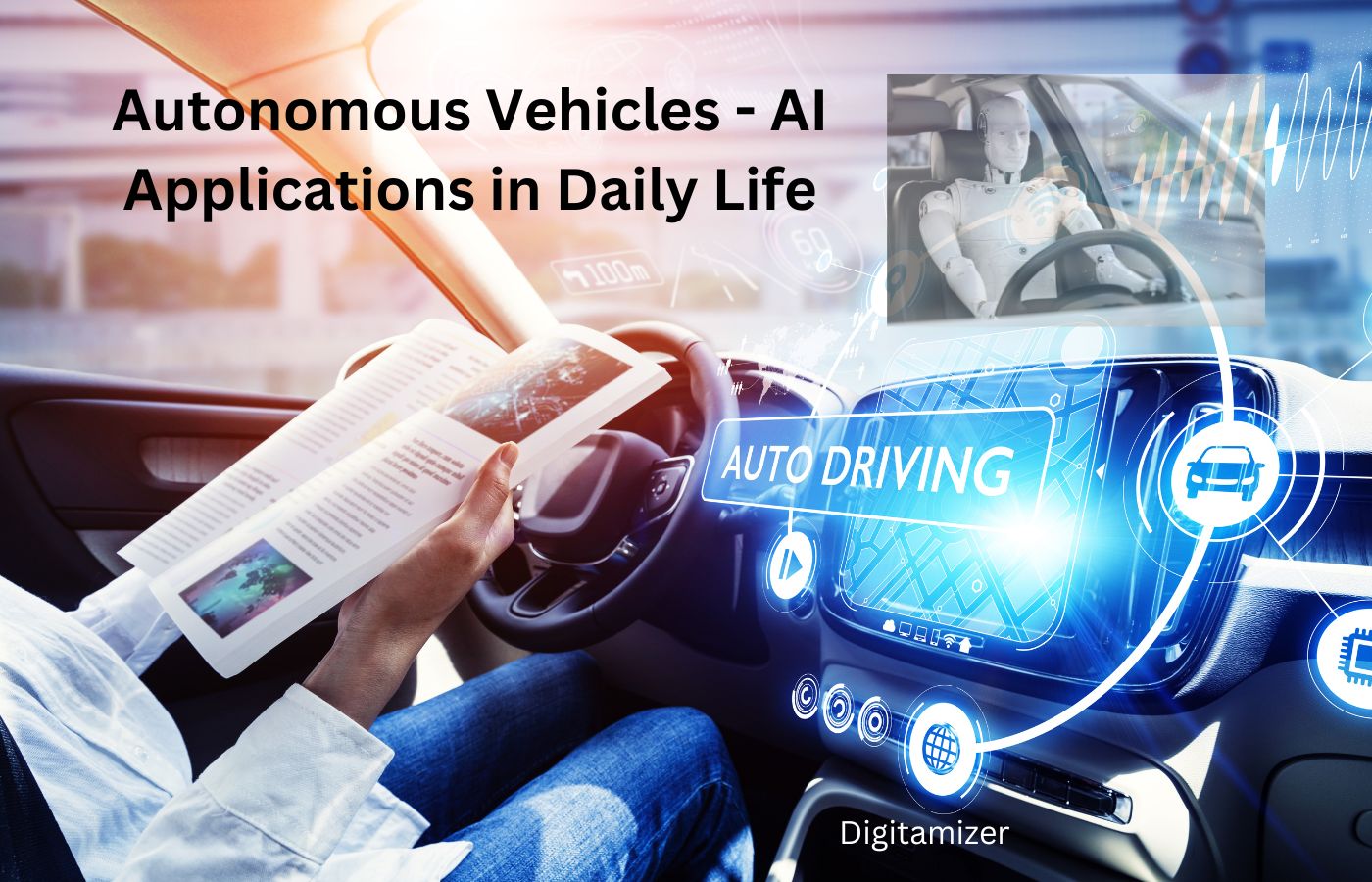
Autonomous vehicles are revolutionizing the way we travel. They have the potential to greatly improve road safety, reduce traffic congestion, and enhance transportation efficiency.
These vehicles are equipped with advanced sensors and artificial intelligence systems that allow them to navigate and make decisions on their own. Autonomous vehicles, powered by Artificial Intelligence (AI), are revolutionizing the way we travel by offering improved, highly efficient, and practical mobility solutions.
They utilize sensor fusion, computer vision, machine learning, and various algorithms to analyze the surrounding environment, navigate through intricate settings, and make instantaneous driving decisions without any human intervention.
Similar to a systems analyst, autonomous vehicles utilize a combination of sensors, including LiDAR cameras and radar, to constantly monitor their surroundings and detect any obstacles, objects, or road conditions.
AI algorithms analyze sensor data to predict the trajectory of a car, anticipate hazards, and determine the optimal route for safe and efficient navigation.
Utilizing AI applications in daily life and AI-powered decision-making capabilities, autonomous vehicles can swiftly respond to dynamic traffic conditions, adapt their speed, and navigate challenging scenarios such as merging lanes or crossing intersections.
In addition, through ongoing analysis of data, they improve their efficiency and become more adaptable over time, which ultimately enhances safety and reliability.
With the rise of autonomous vehicles, urban mobility could undergo a complete transformation, leading to reduced traffic congestion and improved transportation accessibility for all.
With the potential to improve road safety, reduce accidents, enhance vehicle efficiency, and minimize environmental impact, AI-powered vehicles can revolutionize our transportation methods and transform our interactions with cities.
Virtual Personal Trainers – AI Applications in Daily Life

Virtual trainers, powered by Artificial Intelligence (AI), are revolutionizing the fitness industry by offering personalized workout plans, nutrition guidance, and motivational support. Virtual coaches utilize algorithms to analyze user data, including fitness goals, dietary preferences, and performance metrics.
Virtual personal trainers provide customized workout regimens that optimize results and reduce the risk of injuries. With their expertise in analyzing systems, they guide participants through interactive coaching sessions, instructional videos, and real-time feedback. They ensure proper technique during exercises and measure progress to guarantee a safe and effective workout.
In addition, AI applications in daily life and AI-powered virtual trainers offer nutrition advice by analyzing dietary practices, calorie intake, and nutritional requirements. In addition, they have the expertise to provide personalized menu plans, recipes, and dietary supplements. They help individuals reach their fitness objectives while maintaining a balanced lifestyle.
With their expertise in analyzing systems and their deep understanding of user motivation, virtual personal trainers excel at keeping users committed to their fitness regimen through constant interaction and effective strategies.
With the help of AI-driven platforms, users can stay accountable and committed to their diet and exercise routines through gamification, goal-setting, and social support features.
Generally, online personal trainers with AI offer a convenient and easily accessible option for exercise, without the need for a gym. With a focus on personalized training, nutrition guidance, and motivational assistance, individuals are empowered to achieve their fitness goals and maintain a healthy, active lifestyle, no matter their location or schedule.
Conclusion – AI Applications in Daily Life
Ultimately, Artificial Intelligence (AI) has completely transformed numerous facets of everyday life, revolutionizing industries and enhancing worker productivity, all while providing us with more fulfilling experiences.
From personal assistants to recommendation systems to autonomous vehicles and healthcare diagnostics, AI-driven technologies have become essential in our modern lives.
AI applications in daily life have revolutionized the way people and businesses operate, enabling them to accomplish tasks more efficiently and make better-informed decisions.
Just like a systems analyst, AI has made remarkable progress in enhancing people’s lives worldwide. Whether it’s providing up-to-date city navigation, offering tailored recommendations for entertainment and shopping, or enabling advanced healthcare diagnostics, AI applications in daily life have truly revolutionized the way we live.
However, as AI continues to expand and integrate into various aspects of our lives, it also brings forth significant ethical questions and concerns. Concerns regarding the security of information, potential bias in algorithms, and the impact on job displacement require careful consideration to ensure the responsible and ethical use of AI technologies.
Despite these challenges, the transformative power of AI remains truly remarkable. By effectively utilizing AI and working together, we can unlock new possibilities for innovation and tackle societal challenges.
This will enable AI-driven technology to empower individuals and foster inclusivity, ultimately enhancing the overall quality of society.
How do virtual assistants understand natural language?
Virtual assistants utilize natural language processing (NLP) algorithms to interpret and respond to spoken or written commands.
How does facial recognition work on smartphones?
Facial recognition algorithms analyze facial features, patterns, and contours to create a unique biometric template for everyone.
How do social media platforms recommend content?
Social media platforms use machine learning algorithms that analyze user interactions, preferences, and behaviors to recommend personalized content.
How do e-commerce websites suggest products?
E-commerce platforms employ recommendation systems that analyze past purchases, browsing history, and similar user profiles to suggest relevant products.
How do navigation apps predict traffic congestion?
Navigation apps gather real-time data from various sources such as GPS signals, traffic cameras, and user reports, which is then analyzed using AI algorithms to predict traffic conditions.
How accurate are AI-based medical diagnoses?
AI-based medical diagnosis systems can achieve high accuracy rates, often comparable to or even surpassing human experts, depending on the application and the quality of data.
How do smart home devices learn user preferences?
Smart home devices employ machine learning algorithms that analyze user interactions and feedback to adapt and optimize settings based on individual preferences.
How do chatbots understand and respond to customer queries?
Chatbots use natural language processing (NLP) algorithms to understand and generate human-like responses to customer queries, often learning from past interactions to improve accuracy.
How do AI systems detect fraudulent transactions?
AI-based fraud detection systems analyze large volumes of transaction data, identifying patterns and anomalies indicative of fraudulent activity, and flagging suspicious transactions for further investigation.
Can AI-generated content be distinguished from human-created content?
While AI-generated content is becoming increasingly sophisticated, there are still cues and nuances that can sometimes reveal its non-human origin, but the technology is continually advancing.
How do self-driving cars navigate complex environments?
Self-driving cars use a combination of sensors, cameras, radar, and lidar (light detection and ranging) technology, coupled with AI algorithms, to perceive and interpret their surroundings and make driving decisions.
Digital Marketing Services, SEO and E-Commerce Solutions in Delhi, India
Author – Farhanul Haque
The article “11 AI Applications in Daily Life” is written by the Founder of Digitamizer who has been working in the e-commerce Sector Since 2006 and is also a certified Digital Marketing Professional from IIT, Delhi, India.

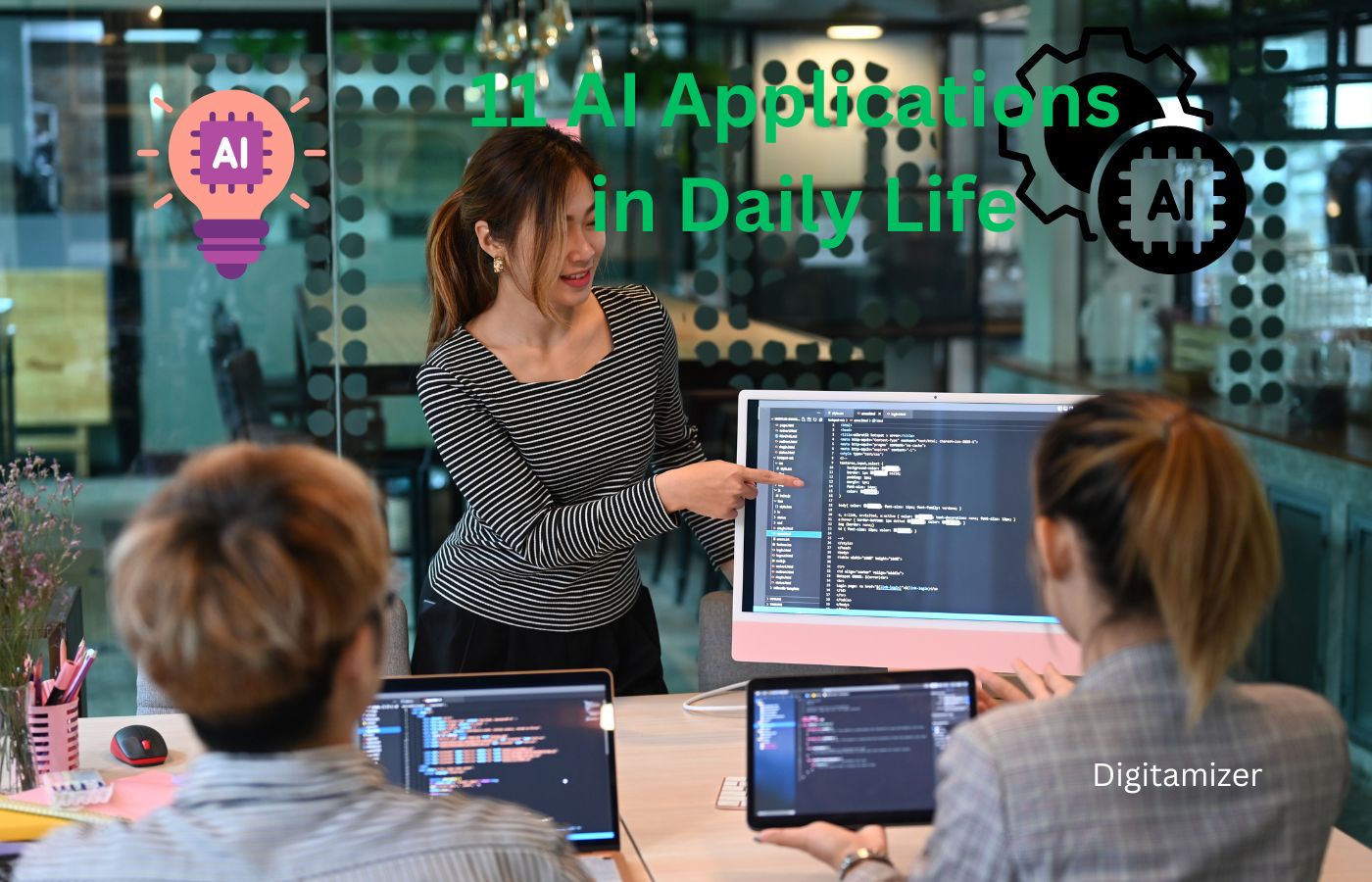
Your article helped me a lot, is there any more related content? Thanks!
Thanks for sharing. I read many of your blog posts, cool, your blog is very good.
Thanks for sharing. I read many of your blog posts, cool, your blog is very good.